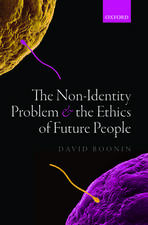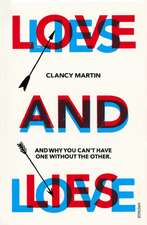Moral Dilemmas in Real Life: Current Issues in Applied Ethics: Law and Philosophy Library, cartea 74
Autor Ovadia Ezraen Limba Engleză Hardback – 24 apr 2006
Applied ethics is that intellectual locale where theory meets praxis. Moral Dilemmas in Real Life is designed to make that meeting point explicit, by presenting a series of issues in well-grounded philosophical formulations.
The book begins with the general relation between the individual and society – instilling ethical tension, and even clashes, between the private and the public in our discourse. Going on, from general to specific, it gradually narrows the ethical playing field to touch on medical ethics, the family, and the practice of punishment. In all cases, the book addresses both consensual and conventional social institutions and distortions thereof.
| Toate formatele și edițiile | Preț | Express |
|---|---|---|
| Paperback (1) | 636.45 lei 6-8 săpt. | |
| SPRINGER NETHERLANDS – 19 noi 2010 | 636.45 lei 6-8 săpt. | |
| Hardback (1) | 642.68 lei 6-8 săpt. | |
| SPRINGER NETHERLANDS – 24 apr 2006 | 642.68 lei 6-8 săpt. |
Din seria Law and Philosophy Library
- 20%
 Preț: 813.10 lei
Preț: 813.10 lei - 20%
 Preț: 569.00 lei
Preț: 569.00 lei - 18%
 Preț: 1225.16 lei
Preț: 1225.16 lei - 18%
 Preț: 950.66 lei
Preț: 950.66 lei - 15%
 Preț: 583.43 lei
Preț: 583.43 lei - 15%
 Preț: 639.25 lei
Preț: 639.25 lei - 15%
 Preț: 641.53 lei
Preț: 641.53 lei - 18%
 Preț: 893.84 lei
Preț: 893.84 lei - 24%
 Preț: 797.37 lei
Preț: 797.37 lei - 15%
 Preț: 579.84 lei
Preț: 579.84 lei - 15%
 Preț: 644.95 lei
Preț: 644.95 lei - 18%
 Preț: 895.76 lei
Preț: 895.76 lei - 15%
 Preț: 644.95 lei
Preț: 644.95 lei - 20%
 Preț: 571.84 lei
Preț: 571.84 lei - 15%
 Preț: 642.03 lei
Preț: 642.03 lei - 18%
 Preț: 1232.26 lei
Preț: 1232.26 lei - 18%
 Preț: 1116.05 lei
Preț: 1116.05 lei - 15%
 Preț: 655.92 lei
Preț: 655.92 lei - 18%
 Preț: 833.54 lei
Preț: 833.54 lei - 18%
 Preț: 898.26 lei
Preț: 898.26 lei - 18%
 Preț: 1016.63 lei
Preț: 1016.63 lei -
 Preț: 390.25 lei
Preț: 390.25 lei - 24%
 Preț: 700.88 lei
Preț: 700.88 lei - 18%
 Preț: 999.60 lei
Preț: 999.60 lei - 18%
 Preț: 1115.77 lei
Preț: 1115.77 lei - 18%
 Preț: 1107.88 lei
Preț: 1107.88 lei - 15%
 Preț: 637.46 lei
Preț: 637.46 lei - 18%
 Preț: 781.94 lei
Preț: 781.94 lei - 24%
 Preț: 815.51 lei
Preț: 815.51 lei - 18%
 Preț: 786.18 lei
Preț: 786.18 lei - 18%
 Preț: 735.21 lei
Preț: 735.21 lei - 15%
 Preț: 653.33 lei
Preț: 653.33 lei - 18%
 Preț: 782.10 lei
Preț: 782.10 lei
Preț: 642.68 lei
Preț vechi: 756.09 lei
-15% Nou
Puncte Express: 964
Preț estimativ în valută:
122.98€ • 128.66$ • 102.16£
122.98€ • 128.66$ • 102.16£
Carte tipărită la comandă
Livrare economică 03-17 aprilie
Preluare comenzi: 021 569.72.76
Specificații
ISBN-13: 9781402041037
ISBN-10: 1402041039
Pagini: 216
Ilustrații: XXI, 180 p.
Dimensiuni: 210 x 297 x 14 mm
Greutate: 0.48 kg
Ediția:2006
Editura: SPRINGER NETHERLANDS
Colecția Springer
Seria Law and Philosophy Library
Locul publicării:Dordrecht, Netherlands
ISBN-10: 1402041039
Pagini: 216
Ilustrații: XXI, 180 p.
Dimensiuni: 210 x 297 x 14 mm
Greutate: 0.48 kg
Ediția:2006
Editura: SPRINGER NETHERLANDS
Colecția Springer
Seria Law and Philosophy Library
Locul publicării:Dordrecht, Netherlands
Public țintă
ResearchCuprins
INDIVIDUAL RIGHTS AND PUBLIC DUTIES.- PRIVACY AND THE PUBLIC SPHERE.- THE OBLIGATION OF THE STATE TOWARD INDIVIDUALS.- PUBLIC SECURITY VS. THE RIGHT TO “BE LET ALONE”.- FREEDOM OF EXPRESSION IN ACADEMIA AND THE MEDIA.- MEDICAL ETHICS.- MERCY DEATH OR KILLING.- DONATING OR SELLING ORGANS.- GENETIC ENGINEERING AND REPRODUCTION.- PARENTHOOD AND THE FAMILY.- RIGHTS OF RELATIVES AND GENERATIONS.- PROCREATION AFTER DEATH.- BABIES AS COMMODITIES.- PUNISHMENT.- PUNISHMENT OF SEX OFFENDERS.- PUNISHMENT AND DOMESTIC VIOLENCE.- CAPITAL PUNISHMENT AND THE MENTALLY RETARDED.
Recenzii
Review by Albert D. Spalding, JD on Jan 30th 2007
Metapscychology Volume: 11, Number: 5
"Technological advances and cultural anomie are among the forces have combined to make moral discourse more difficult, more complex, and more elusive than ever before. Technology has impacted the relationships between individual and society, individuals and each other, and the entire spectrum of what it means to be human. While individuals seek to assert their autonomy and independence, nearly everything they do in public (and often what they do in private) is subject to some form of data capture, surveillance, or monitoring. Within a culture that values personal expression, human progress, and self esteem, human embryos are treated as laboratory artifacts, and babies are commoditized. As moral relativism takes hold across multiple institutions and societal structures, the idea of punishment--indeed, the idea of crime--has become problematic.
Many writers and thinkers have added their voices to a cacophony of monologues that is sometimes misunderstood to be some form of moral discourse. Much of what is proffered is held out as some fresh insight or some clever analysis, but in reality consists of little more than separate streams of unwarranted opinions and emotivist blatherings. Occasionally an ethicist will make specific ethical claims, will support such claims with evidence and argument, and it will map such claims to one or more ethical theories in a way that makes sense.
Meanwhile, there are many books in print dedicated to moral issues. Many of them consist of anthologies of excerpts from the writings of moral philosophers, political commentators, and ethicists. Some are themed (medical ethics, professional ethics, business ethics, etc.), and many are targeted for use in specific college courses in philosophy, psychology, or other undergraduate or graduate ethics-related courses.
Ovadia Ezra neither offers a polemic on moral issues, nor presents a collection of snippets from the writings of moral philosophers. Instead, in Moral Dilemmas in Real Life, Ezra dives directly into specific social and ethical issues, outlines the moral parameters and essential questions that are highlighted by such issues, makes recommendations regarding the moral theories and ethical epistemologies that are likely to offer helpful insights in each case, and charges the reader with the responsibility of completing the analysis and are arriving at practical conclusions. In so doing, Ezra draws from a rich supply of philosophers, ethicists, jurists, and social scientists (whose works, in turn, are referenced in several hundred footnotes).
One of the issues addressed by Ezra is the right of privacy. The author draws from legal precepts, virtue theory, and the insights of various social philosophers in an effort to show the nuances and limitations of the concept. Several specific circumstances, wherein the right to privacy is at issue, are described: questions about the protection of the identity of suspects who are under investigation for a crime (but who have not been charged with a crime); the protection of the medical records, especially of celebrities, artists, politicians, professional athletes, etc.; and gag orders protecting the identity of convicted juvenile offenders who have arrived at the age of majority. Each of these cases are addressed from the perspective of various normative theories, and each are explored in light of judicial pronouncements, the observations of social commentators, and the insights of various social critics.
Separately, Ezra considers the right to "be let alone." That is, the right to live and work without being unnecessarily confronted or encumbered by, or intruded upon, by government (despite the need of law enforcement agencies to ensure safety and security in an increasingly dangerous world). To flesh out this dilemma, the author selects to interesting cases: proposed legislation requiring Internet service providers to retain records -- including contents -- of e-mails and Internet transmissions for a period of seven years; and, the expansion of DNA information banks beyond the immediate needs of law enforcement and medical databases. Both of these cases, and the analyses provided by the author, and help the reader to appreciate the enlarging the scope of both technology and the resultant ethical issues.
Other issues, approached in the same manner, include freedom of expression in academia and the media, mercy killing, the selling of human organs, genetic engineering and reproduction, "parental" rights of relatives and generations, procreation after death, babies as commodities, punishment of sex offenders and those who engage in domestic violence, and capital punishment (especially in regard to the mentally disabled). For each of these dilemmas, the author offers well-researched insights, specific cases, and suggestions that prompt the reader to think carefully and critically about the underlying moral questions.
Even though this book is scholarly and intellectually uncompromising, it is accessible by most readers. In part, this is because the book is written in a style that is pleasant, engaging, and inviting. And it is also because, as Ezra puts it, "any thinking person is required, so it seems, to be concerned, involved, or--at the very least--conversant with the ins and outs of ethical argument." (p. ix) The moral dilemmas presented by Ezra are selected and sifted for the edification of any "thinking person" who would wish to begin a journey toward an understanding of well-informed applied ethics."
© 2007 Albert D. Spalding
Albert D. Spalding, JD, is an associate professor at Wayne State University School of Business Administration. He teaches legal studies and ethics.
Metapscychology Volume: 11, Number: 5
"Technological advances and cultural anomie are among the forces have combined to make moral discourse more difficult, more complex, and more elusive than ever before. Technology has impacted the relationships between individual and society, individuals and each other, and the entire spectrum of what it means to be human. While individuals seek to assert their autonomy and independence, nearly everything they do in public (and often what they do in private) is subject to some form of data capture, surveillance, or monitoring. Within a culture that values personal expression, human progress, and self esteem, human embryos are treated as laboratory artifacts, and babies are commoditized. As moral relativism takes hold across multiple institutions and societal structures, the idea of punishment--indeed, the idea of crime--has become problematic.
Many writers and thinkers have added their voices to a cacophony of monologues that is sometimes misunderstood to be some form of moral discourse. Much of what is proffered is held out as some fresh insight or some clever analysis, but in reality consists of little more than separate streams of unwarranted opinions and emotivist blatherings. Occasionally an ethicist will make specific ethical claims, will support such claims with evidence and argument, and it will map such claims to one or more ethical theories in a way that makes sense.
Meanwhile, there are many books in print dedicated to moral issues. Many of them consist of anthologies of excerpts from the writings of moral philosophers, political commentators, and ethicists. Some are themed (medical ethics, professional ethics, business ethics, etc.), and many are targeted for use in specific college courses in philosophy, psychology, or other undergraduate or graduate ethics-related courses.
Ovadia Ezra neither offers a polemic on moral issues, nor presents a collection of snippets from the writings of moral philosophers. Instead, in Moral Dilemmas in Real Life, Ezra dives directly into specific social and ethical issues, outlines the moral parameters and essential questions that are highlighted by such issues, makes recommendations regarding the moral theories and ethical epistemologies that are likely to offer helpful insights in each case, and charges the reader with the responsibility of completing the analysis and are arriving at practical conclusions. In so doing, Ezra draws from a rich supply of philosophers, ethicists, jurists, and social scientists (whose works, in turn, are referenced in several hundred footnotes).
One of the issues addressed by Ezra is the right of privacy. The author draws from legal precepts, virtue theory, and the insights of various social philosophers in an effort to show the nuances and limitations of the concept. Several specific circumstances, wherein the right to privacy is at issue, are described: questions about the protection of the identity of suspects who are under investigation for a crime (but who have not been charged with a crime); the protection of the medical records, especially of celebrities, artists, politicians, professional athletes, etc.; and gag orders protecting the identity of convicted juvenile offenders who have arrived at the age of majority. Each of these cases are addressed from the perspective of various normative theories, and each are explored in light of judicial pronouncements, the observations of social commentators, and the insights of various social critics.
Separately, Ezra considers the right to "be let alone." That is, the right to live and work without being unnecessarily confronted or encumbered by, or intruded upon, by government (despite the need of law enforcement agencies to ensure safety and security in an increasingly dangerous world). To flesh out this dilemma, the author selects to interesting cases: proposed legislation requiring Internet service providers to retain records -- including contents -- of e-mails and Internet transmissions for a period of seven years; and, the expansion of DNA information banks beyond the immediate needs of law enforcement and medical databases. Both of these cases, and the analyses provided by the author, and help the reader to appreciate the enlarging the scope of both technology and the resultant ethical issues.
Other issues, approached in the same manner, include freedom of expression in academia and the media, mercy killing, the selling of human organs, genetic engineering and reproduction, "parental" rights of relatives and generations, procreation after death, babies as commodities, punishment of sex offenders and those who engage in domestic violence, and capital punishment (especially in regard to the mentally disabled). For each of these dilemmas, the author offers well-researched insights, specific cases, and suggestions that prompt the reader to think carefully and critically about the underlying moral questions.
Even though this book is scholarly and intellectually uncompromising, it is accessible by most readers. In part, this is because the book is written in a style that is pleasant, engaging, and inviting. And it is also because, as Ezra puts it, "any thinking person is required, so it seems, to be concerned, involved, or--at the very least--conversant with the ins and outs of ethical argument." (p. ix) The moral dilemmas presented by Ezra are selected and sifted for the edification of any "thinking person" who would wish to begin a journey toward an understanding of well-informed applied ethics."
© 2007 Albert D. Spalding
Albert D. Spalding, JD, is an associate professor at Wayne State University School of Business Administration. He teaches legal studies and ethics.
Textul de pe ultima copertă
Moral Dilemmas in Real Life purports to supply ways of thinking of, perhaps even dealing with, the ins and outs of ethical argument.such argument. The world today presents both individuals and communities with situations, which demand moral and ethical deliberations. From the more general issues of universal globalization to the very specific problems of every-day existence encountered by active agents, contemporary life is replete with moral and ethical conundrums. Any thinking person is required, so it seems, to be concerned, involved, or – at the very least – conversant with these issues and this book supplies the wherewithal needed.
Applied ethics is that intellectual locale where theory meets praxis. Moral Dilemmas in Real Life is designed to make that meeting point explicit, by presenting a series of issues in well-grounded philosophical formulations.
The book begins with the general relation between the individual and society – instilling ethical tension, and even clashes, between the private and the public in our discourse. Going on, from general to specific, it gradually narrows the ethical playing field to touch on medical ethics, the family, and the practice of punishment. In all cases, the book addresses both consensual and conventional social institutions and distortions thereof.
Applied ethics is that intellectual locale where theory meets praxis. Moral Dilemmas in Real Life is designed to make that meeting point explicit, by presenting a series of issues in well-grounded philosophical formulations.
The book begins with the general relation between the individual and society – instilling ethical tension, and even clashes, between the private and the public in our discourse. Going on, from general to specific, it gradually narrows the ethical playing field to touch on medical ethics, the family, and the practice of punishment. In all cases, the book addresses both consensual and conventional social institutions and distortions thereof.
Caracteristici
Connects between theory and practice Addresses burning current ethical issues Takes a stand on current issues

















